FEATURE
'Save Our Mangroves Now' mangrove training in Tanga, northern Tanzania

By Dominic Wodehouse – MAP
TANZANIA – MAP returned to Tanzania in February to conduct another Community-Based Ecological Mangrove Rehabilitation (CBEMR) training for the IUCN and WWF Germany's 'Save Our Mangroves Now' (SOMN) initiative. This time we partnered with the Tanzania Forest Conservation Group and A Rocha of Switzerland, staying at the Tanga Beach Resort and Spa. We explored the surrounding mangroves with the Tanzania Forest Service (TFS) Northern Zone boss, Mr Ezra to find suitable teaching sites. Fortunately we had two good sites 10 minutes drive from Tanga town. Above on Mombasa Rd, NW of the town. TFCG arranged for us to meet the Tanzania Forest Service officer for the region and local conservation group members. Their issue was fishermen digging under mangrove trees for a worm for fishing bait, killing the trees in the process. The training was opened by Raphaelle Flint (IUCN) and Anouk Neuhaus (WWF), with an introduction to Tanzania's mangroves by Emmnuel Japhet (Wetlands International). a huge thank you to IUCN and WWF for funding this training, Tanzania Forest Conservation Group for the logistics, and (very nearly Dr.) Emmanuel Japhet for safely driving us south to Rufiji and back to Dar. As before, we really enjoyed our time in Tanzania and we are looking forward to returning in the near future. VIEW PHOTOS GLOBAL Mangroves: how they help the ocean
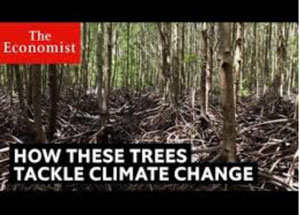
GLOBAL – Mangrove forests are crucial for the health of the ocean and the planet. Meet the pioneering scientists who are harnessing the power of mangroves to help tackle the world’s most pressing issue: climate change. VIEW VIDEO International Day of Forests 2020: As Fires Ravage Forests, Can ‘Nature Super Year’ Salvage Global Biodiversity?

GLOBAL – On March 21, the world celebrates the International day of forests every year since 2012 to raise awareness about the importance of all types of forests. The theme this year is 'Forests and biodiversity: too precious to lose'. As research and observations show that global biodiversity is deteriorating at an accelerated pace and millions of hectares of forests are being lost every year, the theme seems more apt than ever before. "2020 has been referred to as a "Nature Super Year" and must be the year where we turn the tide on deforestation and forestry loss," says UN Secretary-General António Guterres. As per the latest assessment report of the Intergovernmental Science-Policy Platform on Biodiversity and Ecosystem Services (IPBES), 25 per cent of plant and animal species are threatened, and around 1 million species are already facing extinction, many within decades. Moreover, between 2010 to 2015, 32 million hectares of forest were lost in the most biodiverse regions of the tropics. Added to the human pressure, the accelerating climate change and frequent forest fires have been taking a toll on the fragile forest ecosystems. Last year the world witnessed few of the most intense forest fires on record all across the planet—Amazon, Bandipur, California, and Australia bushfires. READ MORE Urgent changes needed to save forests for the benefit of us all

GLOBAL – This March 21, the International Day of Forests is putting the spotlight on the great variety of animal, plant and other life supported by the world’s forests with the theme, “Forests and Biodiversity: Too precious to lose.” While this observance encourages us to appreciate the benefits of forests—from Pacific coastal redwoods to tropical mangroves—it is more of an urgent call to action than a celebration. Forests are home to most life on land, an estimated 80 percent of the world’s terrestrial biodiversity. This natural wealth goes far beyond the 60,000 species of trees that have been identified to date. It includes plants, animals, organisms and ecosystems which help to keep our air, soil and water healthy and which provide us with food, fuel and shelter. Roughly one billion people depend directly on forests for their food, and that figure does not include the farms that rely on nearby forests for pollinators like bees and bats. All this biodiversity is under serious threat from climate change and other forces that are chipping away at the world’s forests on a daily basis. An estimated 73 percent of deforestation in the world is driven by the clearing of land for agriculture. READ MORE What could be wrong about planting trees? The new push for more industrial tree plantations in the Global South
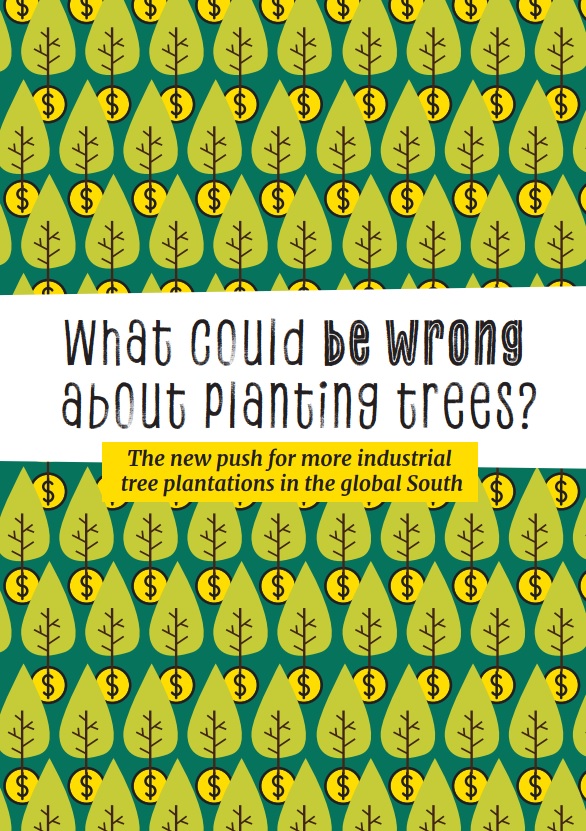
GLOBAL – What could be wrong about planting trees? Haven’t communities around the world been planting a diversity of trees since the dawn of human civilization Yes they have. But in more recent times, companies have also been planting trees, especially in Africa, Asia and Latin America, and the way they do so is very different from that of communities. They cover huge areas with trees from one single species, creating vast industrial or monoculture plantations devoid of biodiversity Today, these same companies plan to start a new round of massive expansion. Exploiting growing public awareness and concern about climate change, they argue that monoculture plantations are an excellent option to help solve some of the world’s most urgent problems: loss of forests, global heating and dependence on fossil fuels (oil, coal and gas). In this booklet, WRM aims to alert community groups and activists about the corporate push for a new round of industrial tree plantation expansion. It also reveals why planting trees on such a large scale can be extremely detrimental, in spite of seductive marketing campaigns claiming that these plantations will or could be a “solution” to the climate crisis.DOWNLOAD PAPER AFRICA Lagos marks International Day of Forests with Tree planting

NIGERIA – The Lagos State Government at the weekend marked the International Day of Forests with tree planting in Lekki area of the State. March 21st was the International Day of Forests, a day set aside by resolution of the United Nations General Assembly in 2012 to celebrate and raise awareness of the importance of forests. The theme for this year’s celebration is ‘Forests and Biodiversity’. Lagos State Government, through the Lagos State Parks and Gardens Agency (LASPARK) donated and planted trees as a contribution to global climate action efforts. The General Manager, LASPARK, Mrs. Adetoun Popoola stated that Biodiversity was under serious threat from deforestation, forest degradation and climate change, saying that forest depletion, combined with heavy industrial effluents and carbon monoxide is a danger to the environment and to humanity which has aggravated climate change, global warming and rainfall patterns around the world. She explained that the day was set aside globally to encourage organizations at local, national and international levels to take action to prevent and reverse global deforestation which gave credence to the present administration’s efforts to achieve a Healthy and Sustainable Environment. READ MORE AMERICA Mangrove Bayou Walkway is Underway

USA – If you’ve visited The Bay recently (while, of course, taking proper precautions), you may have noticed stakes lining the mangroves, which mark the first steps toward realizing the future Mangrove Bayou Walkway. As of this Wednesday, partners at Jon F. Swift Construction put up a fence that officially starts construction for the walkway, which is estimated to be completed by the end of the year. The Mangrove Bayou Walkway will be a safe, lighted walkway that will line the newly revitalized mangroves and coastal wetlands. It is one of many exciting projects The Bay is undertaking as they continue their journey toward building The Bay Park. The best part? The area around the construction fence will be open and accessible to all park goers during the construction process. This means the community is free to take a stroll, enjoy the fresh air and sunshine, and take a look at our progress as it happens. There will be alternative walking routes during the construction process, and importantly, the new walkway will be a significant improvement of the park for everyone. READ MORE ASIA Papua mangroves could help Indonesia coast to climate targets

INDONESIA – The characteristics of mangroves in a range of ecosystems – from undisturbed natural settings to areas where considerable land-use changes have occurred – should be evaluated to properly assess country-level blue carbon emissions accounting, according to new research. While mangroves have long been recognized as significant “blue carbon” sinks and as coastal buffers against erosion caused by ocean activity and sea level rise, now scientists have shown that their carbon storage capacity varies greatly depending on a variety of ecological factors. This discovery could have implications for Indonesia’s targets under the U.N. Framework Convention on Climate Change (UNFCCC). “Our findings show that mangrove regeneration over the long-term has the potential to contribute to Indonesia’s Nationally Determined Contributions (NDCs) by increasing mangrove carbon stocks and offsetting anthropogenic greenhouse gas emissions from land-use change,” said lead author Sigit Sasmito, a researcher at the Center for International Forestry Research (CIFOR) and a Ph.D. candidate at Australia’s Charles Darwin University. READ MORE EUROPE First comprehensive portal to track international capacity development support for forest monitoring

ITALY – The Global Forest Observations Initiative (GFOI) launched a portal – the first such comprehensive platform – to track international capacity development support to developing countries in forest monitoring for climate action. The portal – the GFOI Inventory of Activities – is a one-stop shop with easy-to-access information on more than 400 forest monitoring activities in 70 developing countries across Africa, Asia and the Pacific, Latin America and the Caribbean. Users can search for information by country or region, by type of forest monitoring activities, and by donors. "Collecting and disseminating better information on forests is vital for countries and the international community's efforts to take targeted and effective action on climate change," said Hiroto Mitsugi, FAO Assistant Director-General for Forestry. The portal will help governments and donors identify gaps, share resources, avoid overlaps and explore opportunities for new partnerships to better address the challenges countries face as they develop their National Forest Monitoring Systems. The platform will be maintained by the GFOI Office, hosted by FAO, with funding from Australia and Norway. The portal displays information from the world's leading forest monitoring development partners, including national governments, development practitioners, space agencies and forestry experts. READ MORE OCEANA Fiji: Destroying Paradise
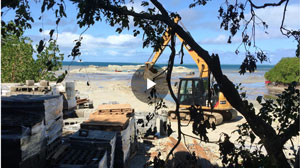
FIJI – We investigate a Chinese developer accused of ruining land and intimidating locals as it builds Fiji's biggest resort. Fiji is sold to tourists as the land of white sandy beaches and clear blue waters but a new resort development is threatening the Pacific nation's idyllic image. A Chinese-owned company is building a casino hotel on Malolo Island, near a world-famous surf break. Landowners claim that without any permits or permission, the company has ripped up 5,000 square metres (53,820 square feet) of the ancient reef, ploughed through a mangrove forest used by locals to source food, and illegally encroached on their property. 101 East investigates how one of the country's biggest resort developments is wreaking havoc on Fiji's pristine environment. WATCH VIDEO
Like this newsletter?
Pease consider donating to MAP to keep it going.
Giving could never be easier | ACTION ALERTS Enough! Pledging zero tolerance to attacks against environmental and human rights defenders. SIGN THE PETITION PETITION – Sea turtles or condominiums?
Sand mining and construction work would wipe out a marine biodiversity hotspot and destroy the livelihoods of local people, who have not been consulted. Please SIGN! PETITION – Save Penang! Reject the 3-Islands Reclamation!
The lack of public consultation and detailed information about the project is shocking in view of the size of proposed reclamation which is 4,500 acres or 7 square miles
PLEASE SIGN
PETITION – Save Pulau Kukup National Park – second largest mangrove island in the world. Sign The Petition Like this newsletter? Pease consider donating to MAP to keep it going. Giving could never be easier 
Mangrove Restoration Map VIEW MAP HERE 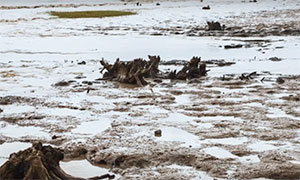
Restoring The Natural Mangrove Forest
Watch movie 
Community Based Ecological Mangrove Restoration in Rufiji Delta VIEW VIDEO Video: Mangroves for the Future – A look bacK. As the latest phase of Mangroves for the Future (MFF) draws to a close, this video highlights some of the project’s most successful initiatives – from local women supporting national park management in Viet Nam to an island in the Maldives that has become a model for waste management, and everything in between. View Here WANT TO GET INVOLVED?
Follow and Join MAP!
   
Like this newsletter? Pease consider donating to MAP to keep it going. Giving could never be easier 

VOLUNTEER OPPORTUNITY 
MANGROVE ISSUES Want to learn more about mangroves?
Our short presentation will give you a better understanding of the issues we are working to solve. WATCH PRESENTATION What is CBEMR? Easy to follow fact sheet – CLICK HERE What is EPIC? – The Ecosystems Protecting Infrastructure and Communities (EPIC) project: the role of ecosystems as protective barriers against climate induced hazards MANGROVES APP AVAILABLE
A pictorial field guide for easy identification of various mangrove species and learning about the mangroves ecosystem. CLICK HERE View MAP’s uploaded Videos at MAPmangrover’sChannel
Question Your Shrimp Consumer/Markets Campaign!
WATCH VIDEO Mangrove Restoration in Asia – Watch Short Video The Value of Mangrove Forests View Video CBEMR Experience Exchange MAP 2017 English Subtitles
VIEW THE VIDEO Mangroves: Guidebook to Malaysia – Click Here
Mangrove rehabilitation in Asia – Local Action and cross-border Transfer of Knowledge for the Conservation of Climate, Forests and Biodiversity VIEW VIDEOS HERE SHARE MAP'S VISION
CLICK HERE to watch short introductory video. Together we can work "at the roots of the sea". Our short documentary, Reducing the Risk of Disaster through Nature-Based Solutions : Mangroves
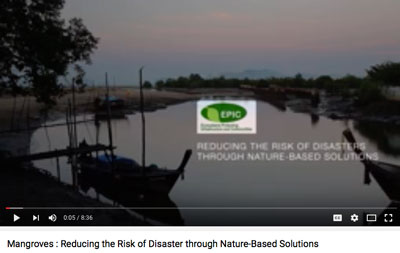
Exclusive Interview with Alfredo Quarto, Co-Founder and Executive Director of Mangrove Action Project – See more
Marvellous Mangroves Curriculum The Marvellous Mangroves Education Forum is an online hub for those utilizing the Marvellous Mangroves (MM) Curriculum. It gives students, teachers and anyone interested in mangroves, the opportunity to learn and share ideas themed around the curriculum, to connect and communicate with others around the globe whilst exploring mangroves from your computer or on the go. VISIT 
The award-winning Marvellous Mangroves (MM) curriculum educates children on the importance of mangroves and their ecological functions, teaching them about modern challenges and mechanisms for sustainability. VIEW VIDEO Marvellous Mangroves Curriculum in Bangladesh – WATCH VIDEO
MARVELLOUS MANGROVES IN BRAZIL
En Portuges 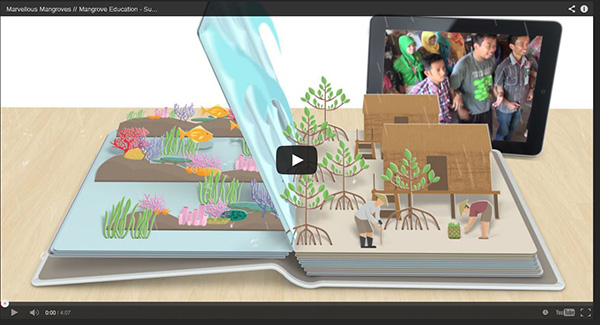
Marvellous Mangroves – A Curriculum-Based Teachers Guide. FOR MORE ON MAPs AWARD WINNING CHINA MANGROVE CURRICULUM VISIT

VIMEO SHOW
VISIT OUR "MM" WEBPAGE Check out our presentation for more details on Marvellous Mangroves Read this 10 page history of the development of MAP’s educational curriculum VIEW DOCUMENT
Article in Canada's Green Teacher Magazine – Read More
Like this newsletter? Pease consider donating to MAP to keep it going. Giving could never be easier 
Green Planet Fundraising Assists MAP – LEARN MORE
Volunteer Opportunities with Mangrove Action Project CLICK HERE
"Question Your Shrimp" Campaign Question Your Shrimp- Don't Buy or Sell Imported Tropical Shrimp! Sign the Petition Learn more about the affects of the shrimp industry on mangroves by visiting our blog
Editor’s Note: Mangrove Action Project’s Executive Director, Alfredo Quarto was interviewed about shrimp by Green Acre Radio’s Martha Baskin
LISTEN TO INTERVIEW Sign the Consumer's Pledge to avoid imported shrimp
Not yet a MAP News subscriber?
Click here to subscribe. Note to Our Readers: We strive to keep active links in our newsletter. However, due to circumstances beyond our control, occasionally links to stories may become broken. If you find a link to a story is not functioning, please cut and paste the headline into your browser search bar. In most cases you should be able to locate the original story.
|

























